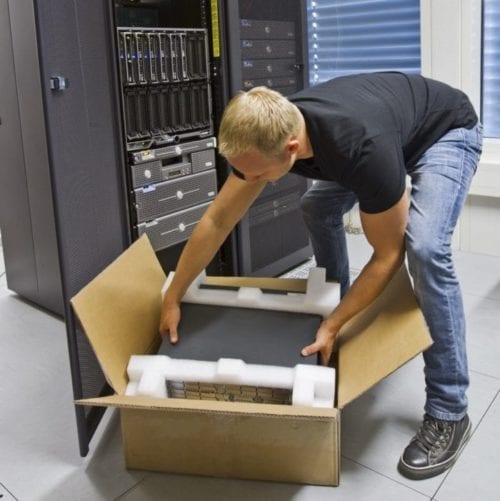Do you want to sell your data center server without stress and in compliance with your privacy?
Editor’s note: if you’re upgrading soon and have a data center server to liquidate before your upgrade, visit our other page to get a server buyback quote.
Dell-EMC, HPE Servers Have the Largest Market Share
Don’t say enterprise data centers are dead!
According to market research firm IDC’s worldwide server market report, in the third quarter of 2018, worldwide server shipments increased 18.3% year-over-year to 3.2 million units.
Also, vendor revenue grew 37.7% to $23.4 billion during that period.
Dell (17.5% market share) led the way, switching places with last year’s number two, HPE, now at 16.3%.
These companies go head-to-head quarter by quarter. This is evidence of their enduring popularity.
Lenovo and Cisco are in the battle along with IBM. This tends to focus on the high-end of the server market since selling off its x86-based server line to Lenovo in 2014.
With our focus on repurposing IT assets, we have some insight into what’s hot in the server market. We’ll give you this list of top data center servers, along with some industry insight into what makes them sizzle:

Top Reviews of Dell PowerEdge Servers
Dell EMC has a comprehensive line of rack servers. They aim to meet the needs of virtually any enterprise, from SMB to large.
Now joined with EMC, it has access to top storage, security and virtualization technologies. These technologies can be integrated or added on to data center server assets.
Dell PowerEdge R940 Family of Servers
The Dell PowerEdge R940 is “a beast of a server,” according to IT PRO, “offering a mighty 4-socket Xeon Scalable solution in a surprisingly small package.”
Many enterprises will move up from the predecessor R930. This will give other companies an opportunity to buy in relatively low for the previous champion.
The R940 also has a variant with a little more oomph, the Dell PowerEdge R940xa. “With the R940 you can have 4x CPUs and 2x GPUs,” explains ServeTheHome. “With the PowerEdge R940xa one can have 4x CPUs and 4x GPU or 8x FPGAs.”
Dell PowerEdge R840
Next up is the Dell PowerEdge R840.
It’s a “pint-sized powerhouse…a very different beast to its predecessor, the R830” according to IT PRO. It has twice the memory capacity and more drive bays.
Dell R740 Servers
As part of its 2017 refresh announcement, Dell introduced the R740 server family. This includes the mainstream R740 as well as the R740xd “extreme disk” version.
“There are few applications this new server wouldn’t excel in, which is exactly the direction Dell EMC took when designing this ever-modular platform,” says StorageReview.com.
And IT PRO chimes in that “…the PowerEdge R740xd packs a superb range of storage features into its 2U chassis and teams them up with a class remote management act.”
Organizations Scaling Down Their Servers
Scaling down, organizations have the option of the Dell PowerEdge R640—“an extraordinarily customizable system,” according to ServeTheHome.
Meanwhile, the Dell PowerEdge R540 offers a 2U, dual-socket chassis in a small footprint with large storage.
Top Models:
- R940xa
- R940,
- R840
- R740xd
- R740
- R640
- R540

HPE Server Line Refresh Good for Business
In mid-2017, HPE previewed a complete refresh of its line with the new Generation 10 ProLiant server family.
They promised better security and manageability.
“The security feature is at the firmware level, with an iLO (integrated lights out) offering made from custom HPE silicon and iLO firmware,” The Register reported. “The aim is to repel firmware attacks and stop servers executing compromised firmware code.”
HPE ProLiant Servers
The HPE ProLiant DL580 Gen10 is a 4U expandable “workhorse server.”
It’s equipped with a flexible processor tray. One that supports one-to-four Intel Xeon Scalable processors with up to 28 cores per processor, along with as much as 6TB of memory.
It has a flexible drive cage design supports up to 48 storage devices. The HPE ProLiant DL560 Gen10 also supports up to 4 processors in a 2U form factor.
Mainstream users will cheer the HPE ProLiant DL380 Gen10 that, according to FedTech Magazine, “can serve files, become part of a cloud, anchor the core of a virtual machine network, house database apps, participate in Big Data functions or handle numerous other operations.”
“The DL380 Gen10 receives a complete refresh in the storage department with a new modular design. HPE’s Smart Array RAID controllers have also been uprated to offer more storage and interface choices,” says IT PRO,
HPE ProLiant DL360 Gen10 is a 1U version designed for compact spaces.
Then there’s HPE’s large commercial, air-cooled, HPC platform, the HPE Apollo 6000 Gen10 System.
It was designed “to deliver over 300 teraflops per rack, higher rack-scale efficiency and exceptional price performance,” according to StorageReview.com.
HPE has positioned the HPE Apollo 6000 Gen10 System as the most secure HPC system available.

Lenovo ThinkSystem Leverages New Xeon Scalable Processors
Lenovo may be sneaking up on competitors. “The company’s acquisition of IBM’s x86 server in 2014 left Lenovo positioned well for the enterprise server ecosystem and more agile than competitors like Dell EMC or Hewlett Packard Enterprise Co.,” says Silicon Angle.
Industry analyst Patrick Moorhead writes in Forbes that Lenovo is staking out a claim on the hyperscale market that it sees as including large enterprise data centers.
ThinkSystem Servers
The ThinkSystem models it unveiled in 2017 are gaining notice.
“Lenovo has unleashed a host of new ThinkSystem servers which benefit from the latest Intel Xeon Scalable processors, and this hardware has set a whole load of new world record benchmarks,” says TechRadar.
Inside HPC says the Lenovo ThinkSystem SR670 “completely re-thinks traditional board-level design: no longer are devices in fixed positions on a large, static motherboard.
Instead, the system is compartmentalized, with different functions placed throughout the system, optimized for access, cooling and performance.
Integrated modularity is achieved by leveraging flexible PCI lanes instead of PCIe slots.”
A level down, the Lenovo ThinkSystem SR650 “represent a huge step forward for Lenovo as it’s well designed, good value and highly expandable,” says IT PRO. They also add that “the new xClarity Controller finally brings Lenovo into 21st-century server management.”
The dual-socket 1U Lenovo ThinkSystem SR570 covers the bases of cloud, virtualization, and traditional IT workloads. While the dual-socket 2U Lenovo ThinkSystem SR550 aims to span small to large-size enterprises with a cost-effective solution for key workloads.
Quanta Servers
Potentially the most interesting name in a data center server in recent years, Quanta has served both as an original design manufacturer (ODM), and an OEM.
They provide a full coverage of server options, with everything from 1U servers and microservers, to multinode, cluster, and GPGPU servers.
The use case for the main OEMs is typically the interface and support, whereas a company like Quanta makes more sense for organizations that don’t need the full suite of services from someone like Dell-EMC.
Supermicro Servers
Supermicro produces servers as a whitebox service for the other big server companies anyways. As with Quanta, purchasing from a company more oriented towards manufacturing than services presents a tradeoff.
The cost of acquisition will be lower, but the services offered are less comprehensive.
With that said, Supermicro does in fact offer a support contract with 4-hr response time if necessary. Many administrators find it easier to simply purchase spares and operate under the assumption that clusters can continue to function if a server goes defunct.
Sell your used Supermicro servers and recoup your investment!
Used Hardware Still in Demand
Constant refreshing of the Dell and HP top lines leads to new demand from data centers eager for more power, improved ROI, more compact rack-mount devices—or a combination of all three.
Learn more about how to sell Quanta servers and storage systems.
At the same time, as companies upgrade, they also often look to liquidate older assets.
This gives other companies a good chance to buy more compute for their own needs at a sizeable discount to buying new systems.
Then these new systems are running Windows Server 2019. Read our blog on Windows Server 2019 Key Features for more information.
This end of the market is also refreshed with the growing migration of cloud services and hyperscale data centers, leading some companies to decommission older, less efficient data centers.
Worldwide Server Market, Third Quarter, 2018

Source: International Data Corp.
Let us help you sell your servers if you are considering a data center upgrade.
We can also help you sell your RAM, processors and computers in bulk.
Frequently Asked Questions:
How much money do data centers make?
Our best guess? Colocations on average make around 8 million in revenues yearly. Based on revenue estimates from statista and total colocations from datacentermap.com, an easy extrapolation comes out to 8.2 million. Private data centers are often not built for the purposes of revenues, but instead are used to house equipment for the company’s own use. Additionally, financial reports that are granular enough to support a general estimate are hard to come by.
What is a server in a data center?
A server in a data center is essentially a type of specialized computer that handles computational workloads for the data center as one unit of many. The servers communicate together to handle the demands of applications and storage via high speed networking connections.
How many servers does a data center have?
On the lower end, a small, in-house data center could somewhere near 1000 servers. Most data centers are quite large, however, and a more typical number is close to 100,000 servers.
Ready To Sell Your Data Center Server?
At exIT Technologies, we have over 25 years of experience providing the best options for companies of all sizes get the most value for decommissioned data center servers. All with quick, easy and secure service. Get in touch with a dedicated solutions manager today!



